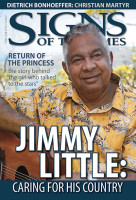A woman recently wrote to an advice columnist relating how she met her husband. At the time, the woman, only 14 was given the honour of reading from the Bible during an Easter service. At that service, she noticed a new family in church, especially the oldest son, whom she learned was 16. “His black curly hair and dimples almost made me lose my place,” she recalls. His name was Jim. He was a bright student, completing high school before his 16th birthday. When World War II broke out, he joined the navy a few days after his 17th birthday.
She saw him off at the train station.
Jim explained he had not slept much the night before but prayed for two things—that he would come back alive and that the little blond from church would be waiting for him. Shortly before the war ended, Jim came home on a 10-day leave. On the spur of the moment, they decided to get married.
“That was 53 years ago, and we have had, and are still having, a fuller life than I ever could have imagined,” she wrote.
Many people would consider a satisfying and fulfilling marriage of 53 years amazing in this day and age. Yet, the truth is that any couple can have an amazing marriage. The key is paying attention to the little things which keep love alive over the decades. Here are nine steps to an amazing marriage.
1. Apologise frequently.
Satisfying, long-term marriages usually contain the vital trait of knowing when one is wrong and promptly apologising for the offensive action. Do not hesitate to express sincere regret and apology if your words, attitudes or behaviour were wrong.
Actor Charlton Heston has not only one of the longest running careers in Hollywood but one of the town's longest- running marriages: 63 years with photographer, Lydia. Asked for the “secret” of his successful marriage, Heston says, “You've got to pick the right girl in the first place. And much more important, as a husband, you have to remember the crucial importance of three little words: ‘I was wrong.' That will take you a lot further than ‘I love you.'”
2. Take up residence in someone else's point of view.
That means learning to listen. Provide the opportunity and freedom for your partner to express his or her opinion without interruption, interference or interpretation.
Learn to really listen to a spouse. When they are through speaking, repeat out loud what they have told you without adding or embellishing what was said.
A good way to do that is to simply say: “Just so I understand, what you are feeling is ...”
Improve your listening skills by reflecting on this observation from writer John Erskine: “The body travels more easily than the mind and until we have limbered up our imagination, we continue to think as though we had stayed home. We have not really budged a step until we take up residence in someone else's point of view.”
3. Pray for your partner.
Daily ask God to bless your spouse. If your husband or wife is experiencing stress, ask God to bless them with feelings of peace. If your partner is in need of clarity, ask God to bless them with insight. If your mate is undergoing physical or emotional pain, ask God to bless them with healing. If your spouse has a success, praise God for the achievement.
Apply in your marriage the command of Scripture: “Pray for each other” (James 5:16). Prayer is a form of intimacy which will further tighten the bond between you and your spouse.
4. Keep a sense of humour.
Too often, life is intensely serious. Lighten and brighten your marriage by cultivating and maintaining a sense of humour. Try to see the funny side of life. Two people who do this are actor Gregory Peck and his wife, Veronique. They first met when Veronique Passani was working as a reporter in Paris and interviewed Peck during the filming of Roman Holiday in 1953. Impressed with the young reporter, Peck decided to call her at the newspaper, asking if she would join him for lunch. Upon getting through to her and making his request, Peck was surprised when Veronique didn't say anything. After a lengthy pause, she finally agreed.
Months later, Peck asked her why she'd taken so long to make up her mind to have lunch with him that day. She said, “I had an appointment to interview Albert Schweitzer at the apartment of Jean-Paul Sartre.”
Peck's response: “You made the right choice.”
5. Talk regularly.
That advice comes from Dr Jerry Lewis, senior research psychiatrist at the Timberlawn Psychiatric Research Foundation. “No matter how busy you are, set aside at least 20 minutes for an ‘end-of-the-day review' with your spouse. Ask such simple questions as “What was the best part of your day? Did anything funny happen today?” Train yourself to listen nonjudgmentally to the answers, so you can create an atmosphere in which you gradually begin to feel safe exploring the multitude of issues in your lives.”
Be sure to choose a time for talking when both of you are emotionally available.
For example, if one partner comes home from work drained, exhausted and irritable, schedule the talk time for later in the evening when that partner has had time to relax and unwind.
6. Be loyal.
When Joan Rivers' only daughter, Melissa, was about marry John Endicott, the comedian wrote an open letter to “Missy,” offering her advice as she began this new chapter in her life. In her letter, Rivers emphasised the importance of loyalty to one's partner. “Daddy and I used to say that the two of us were a little army. Even before you came, he and I were shoulder to shoulder against the world,” Rivers wrote. “You and John must become such an army. Through the years I've always admired your loyalty to your friends, your family, your schools; but the moment that ring circles your finger, your primary loyalty should be to your husband. Loyalty is the absolute essence of a marriage.”
7. Expand your joy level.
Remind yourself not to let the pace of life constrict your level of joy and pleasure together. The many pressures couples face today—working, commuting, housekeeping, parenting, volunteering, making mortgage payments—conspire to make daily life a series of pressures, one after another. Slow down the pace and make room for joy.
“Sometime we get parsimonious about love—too few hugs, too few compliments, too little time for each other,” writes Dr Harville Hendrix and Helen Hunt in their book The Couple's Companion: Meditations and Exercises for Getting The Love You Want. “Often our frugality reflects the scarcity or impermissibility of pleasure in childhood, our indoctrination that fun or pleasure is ‘evil.' We take no pleasure in pleasure.”
Their advice: “Time to begin retraining your old brain to revel in intense and abundant pleasure. Come up with something that you and your partner can do today to stretch the limits of your potential for joy. Ten minutes of belly laughing? Staying in bed till noon? The world's largest banana split?
Go for it!”
8. Always be courteous and considerate.
Do not let engagement courtesies fall by the wayside after marriage. Continue to treat your partner as though it was your first date. Here is sound advice from Dr Leo Buscaglia from his book, Born For Love: “We are often more considerate and understanding of total strangers than we are of our wives, husbands and children. Curiously, true consideration and genuine affection often seem reserved for insignificant, rather than significant others... . [Yet a] kind word, sincerely stated, can work magic, most notably in relationships where the magic is gone. We are never so sophisticated or so comfortable in a relationship that the little niceties can be neglected. If they are good enough for total strangers, they are certainly good enough for the people we love.”
9. Educate yourself about love.
In the story of Candide, Voltaire has his hero and heroine discuss their loving future together. Their love blinds them to the fact that their expectations are massively different. Her dream is for pearls, ruby rings and palaces with marble swimming pools. His goal is to live simply on a few acres of land with a pig, a cow and a vegetable garden. They are naive in their expectation that their love will bridge the differences.
Too many people enter into marriage overly idealistically. They mistakenly assume that everything will fall into place without effort. Consider shaping your idealism into a practical, workable reality by educating yourself about love and relationships.
Read books and magazine articles on ways to cultivate a successful marriage.
Participate in a seminar on communication skills. Attend a retreat for married couples. Enrol in a class on marriage and family life. Keep learning all you can about marriage.
If you run into a problem in your relationship, visit a library and find some books relevant to the issue. Read and study them. Then, apply what you learn to resolve the matter and strengthen your relationship.







